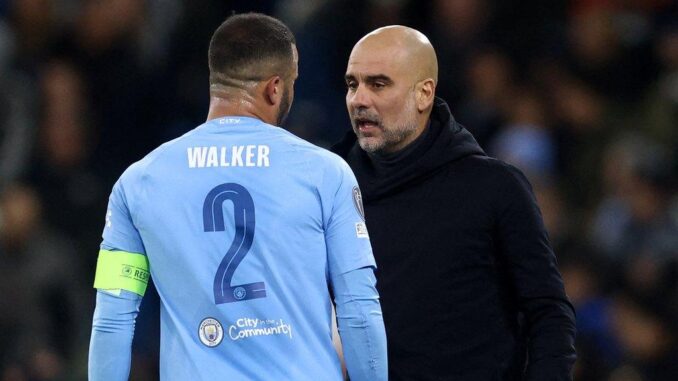
In a surprising turn of events during the January transfer window, Manchester City’s seasoned right-back, Kyle Walker, secured a loan move to AC Milan, a decision that has sent ripples through the football community. This move not only marks a significant shift in Walker’s illustrious career but also unveils underlying tensions within the Manchester City camp, particularly concerning his relationship with manager Pep Guardiola.
Walker, who has been a pivotal figure at Manchester City since his arrival in 2017, has contributed to the club’s domestic and European successes. His tenure boasts six Premier League titles, two FA Cups, and a coveted Champions League victory. However, the 34-year-old defender found himself grappling with limited playing time in the current season, a situation exacerbated by the emergence of younger talents like Rico Lewis.
Feeling marginalized and eager for regular first-team action, Walker made the decisive move to approach Manchester City’s director of football, Txiki Begiristain, to express his desire to leave the club. This decision to bypass Guardiola, with whom he shared a close professional relationship, left the manager “disappointed.” Guardiola had anticipated that Walker would discuss his intentions directly with him, given their history and mutual respect.
The dynamics between players and management are often intricate, and in this instance, Walker’s choice highlights the complexities athletes face when navigating their careers. By opting to communicate his departure through Begiristain, Walker may have been seeking a more formal or strategic approach, possibly aiming to expedite the transfer process. Nonetheless, this move inadvertently strained his rapport with Guardiola, who valued open and direct communication with his players.
Upon securing the loan to AC Milan, Walker addressed the media, reflecting on his conversation with Guardiola. He described it as “not a very comfortable conversation,” acknowledging the challenges inherent in such discussions. Despite the discomfort, Walker emphasized his enduring passion for the game, stating he still had the “fire in his belly” and was eager to prove himself in the Italian league.
Walker’s debut for AC Milan was nothing short of high-profile, as he was thrust into the starting lineup for the intense Milan derby against Inter Milan. The match culminated in a 1-1 draw, with Walker delivering a commendable performance, signaling his readiness to embrace this new chapter. His family, including his wife Annie Kilner, had traveled to Italy ahead of the game, underscoring the personal and professional commitment involved in this transition.
This move to AC Milan not only offers Walker the opportunity for regular playing time but also serves as a platform to rejuvenate his career. The Italian Serie A presents a different set of challenges and styles, allowing Walker to adapt and showcase his versatility as a defender. Moreover, performing consistently at a high level with Milan could bolster his prospects of rejoining the England national team, especially under the new management of Thomas Tuchel.
From Manchester City’s perspective, Walker’s departure necessitated strategic adjustments. The club responded by investing £182 million in new talent during the January transfer window, aiming to fill the void left by experienced players like Walker and to strengthen the squad for the remainder of the season.
Walker’s decision to leave Manchester City also sheds light on the broader challenges veteran players face in elite football clubs. As teams continually evolve, integrating emerging talents and adapting to new tactical approaches, seasoned players often find their roles diminishing. For someone of Walker’s caliber and competitive spirit, the prospect of reduced playing time can be a significant impetus for seeking opportunities elsewhere.
Furthermore, this episode underscores the importance of communication within football clubs. Guardiola’s disappointment highlights the expectations managers have regarding transparency and direct dialogue with their players. Such interactions are crucial for maintaining trust and understanding within the team dynamic.
As Walker embarks on this new journey with AC Milan, the football world will keenly observe how he adapts to Serie A and contributes to his new team. His experience and skill set position him as a valuable asset for Milan, and his performances will undoubtedly influence the club’s aspirations for the season.
In conclusion, Kyle Walker’s loan move to AC Milan is a multifaceted development that intertwines personal ambition, professional relationships, and the ever-evolving nature of football careers. While it marks the end of a significant chapter at Manchester City, it also opens the door to new opportunities and challenges in Italy. Walker’s journey serves as a compelling narrative of resilience, adaptability, and the relentless pursuit of excellence in the world of professional football.
Leave a Reply